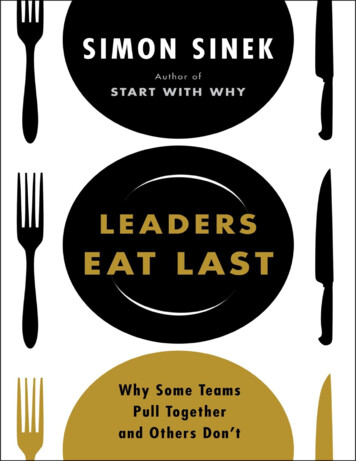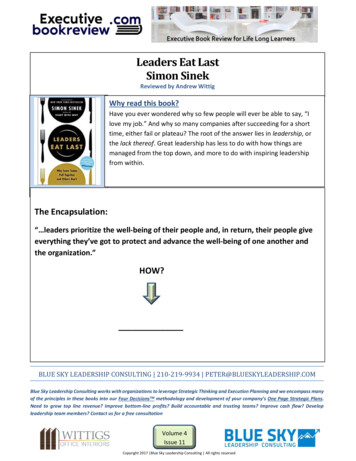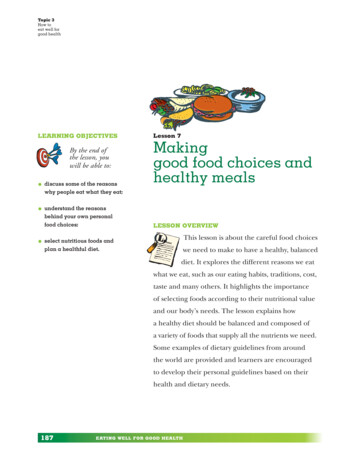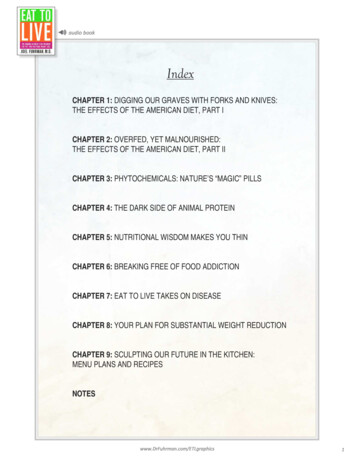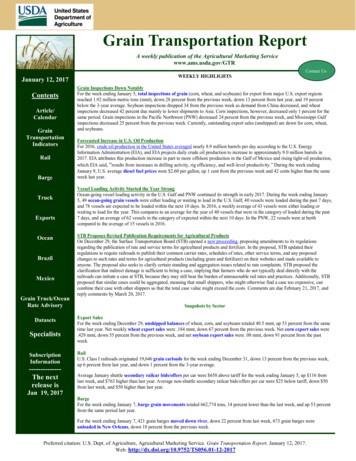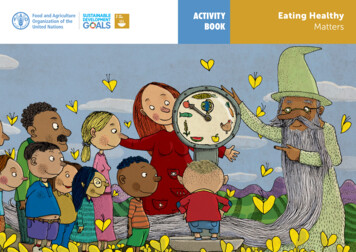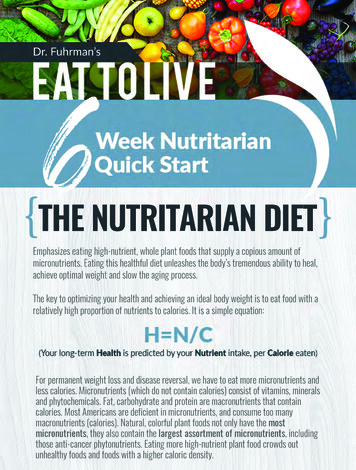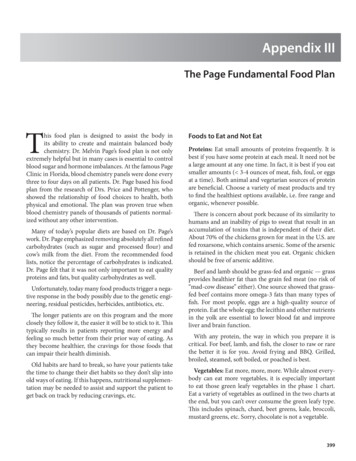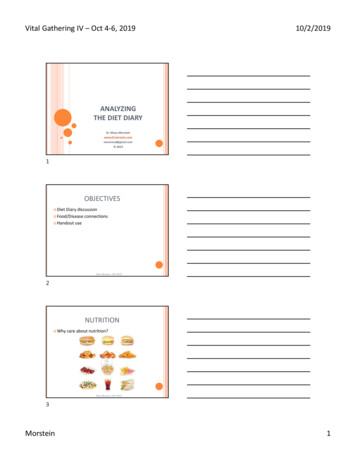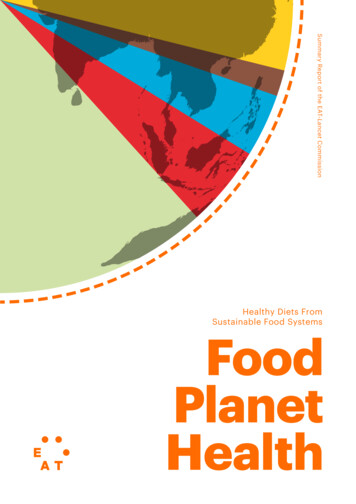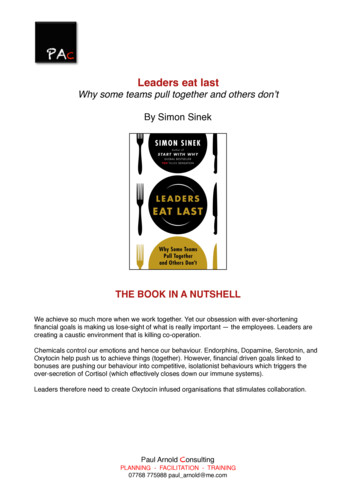
Transcription
Leaders eat lastWhy some teams pull together and others don’tBy Simon SinekTHE BOOK IN A NUTSHELLWe achieve so much more when we work together. Yet our obsession with ever-shorteningfinancial goals is making us lose-sight of what is really important — the employees. Leaders arecreating a caustic environment that is killing co-operation.Chemicals control our emotions and hence our behaviour. Endorphins, Dopamine, Serotonin, andOxytocin help push us to achieve things (together). However, financial driven goals linked tobonuses are pushing our behaviour into competitive, isolationist behaviours which triggers theover-secretion of Cortisol (which effectively closes down our immune systems).Leaders therefore need to create Oxytocin infused organisations that stimulates collaboration.Paul Arnold ConsultingPLANNING - FACILITATION - TRAINING07768 775988 paul arnold@me.com
THE BOOKLeadershipTrust - Successful organisations have a strong culture create trust amongst its members.Trust is the most important quality any person or organisation must have to maintain long-termrelationships. Trust is like a lubricant. It reduces friction and increases performance. However, it’svery easy to break trust. Critically, leaders need to understand the importance of people andrelationships to achieve their vision.In August 2002, in Afghanistan, Captain Mark Drowley (nicknamed Johnny Bravo)performed a ‘let down’ in his A10 attack aircraft (where they fly close to the ground inrange of enemy fire, to ascertain the movements of the troops). When askedafterwards why he decided to do such a brave move, he simply replied. “Because theywould have done it for me”. His heroic attitude and actions are part of the military’sculture.In the days of the industrial revolution (and after), people were treated like machines.Clock in. Clock out. Emotionless. Just a constant drive for higher productivity. So itwas at Hayssen Sandiacre. When Bob Chapman took over the ailing company, hesaw the workers joking together in the tea room, but lose all their lifeblood when theywent back into the factory (80% of people surveyed by Deloitte's were dissatisfied withtheir jobs). He wanted them to enjoy their time at the workbench and not just in thecanteen. He listened to the workers describe how they were not trusted, were watchedand monitored all the time. Chapman recognised the need for greater humanity in theworkplace. He allowed the workers greater autonomy, treating them with dignity,respect and trust. This changing attitude helped increase turnover from 55m to 95m.Culture - A culture is often described as the hidden hand of control. Staff unconsciously follow thevalues, beliefs and ‘ways of doing things’ of an organisation. When the culture is strong, it guidesbehaviour (and vice versa when the culture is weak). A key role of leadership is to maintain/develop a strong culture. Cultures that solely reward financial achievements shift the organisationaway from its values. Bad cultures breed bad leaders and hence, bad employees.Weak culturesmake people do what is right for them and not what is right for the organisation.‘Long term greedy’ is how a past employee coined the way Goldman Sachs operated.Goldman Sachs had a very strong culture in the past. People had to be a high standardof character to be accepted into the firm. In 1999, they went public, leading to anexplosion in financial innovation. A new type of aggressive trader came in. Thecompany’s culture started to shift. Old company values (such as ethics) got swept to oneside by the allure of rapid profits and eye-watering bonuses; people were pitchedagainst each other leading to low trust, low respect and low accountability. Theenvironment was one of ‘win at all costs’ — even of it meant squashing their co-workers.The culture had turned ‘toxic’.Vs In November 2008, terrorists raided the Taj Mahal Palace Hotel in Mumbai withautomatic weapons, killing 31 people. Employees risked their lives to save their guests,forming human rings around them, and returned back inside to help rescue other guests.Paul Arnold ConsultingPLANNING - FACILITATION - TRAINING07768 775988 paul arnold@me.com
The culture was totally geared to putting the guests first. When recruiting, they classempathy and respect higher than academic grades.Parent-Leader - To be put in charge of someone is a special gift. Like a parent, a manager/leaderis responsible for developing their potential. We should treat our employees as if they are family.When the going gets tough at home, we see it through thick and thin — together. In work weshould sacrifice the numbers to save the people — not vice versa. When you stand behind yourpeople, they stand behind you. If you grow your people, you grow your numbers.Leadership requires a commitment and constant attention to managing the dynamic ecosystem ofteams. It takes time. Like a parent they have to make personal sacrifices for the common good ofthe organisation.Charlie Kim of Next Jump has instituted a Lifetime employment policy — i.e. no-one getsfired — they just get coached. He says you would never fire your kids, so why fire yourpeople? This led to a massive change in the culture. People started communicating moreopenly. Mistakes and problems were pointed out quicker, and productivity shot up. Averagerevenue has grown by 25% every year since.Lead the people, not the numbers - Leadership is about taking responsibility for lives not justnumbers. Lives are, after all, more important than numbers. The reality is, if we look after thepeople, the numbers will take care of themselves.With an eye only on short-term wealth, leaders cannot hope to inspire confidence as the quickestway to increasing profit is reducing cost. Furthermore, with the eye-watering explosion of bonusesto senior Directors, it is no surprise this policy still continues. Our new obsession with shareholderwealth is killing the ‘golden-goose’ of employee collaboration.Empowerment - The strength of a leader needs to be measured as much by the legacy s/he leavesbehind them. Research shows that organisations led by an empowering leader outperform‘directive style leadership organisations’ as a higher level of team-learning, empowerment andcollaboration is built into the culture. Good leadership is like exercise. You will not see animmediate improvement, but it will pay-off in the long run.Captain David Marquet was a distinguished sub-marina, who was put in charge of USSSante Fe (which was ranked last in the Navy metrics). One day, he issued a command,“Ahead two-thirds”. However no change was made. When he asked the helmsman why nochange was made, the deputy replied that on this vessel there was no ‘two-thirds’. WhenMarquet challenged him why he accepted the order, the office replied, “Because you told meto”. He noted that people at the top have all the power but none of the information (and viceversa). This triggered a whole new way which he managed the submarine. Instead of a topdown command system, he empowered all staff with the power of making the right decision.Leaders were addicted to power and control. The language was changed from “Sir, Requestpermission to ” to, “Sir, I intend to ” This way the person now owned the action. Thismassively built morale and bridged a new quality of relationship. Sante Fe then cruised up tobecoming the best rated crew in all Navy history. Captain Marquet comments, “The goal of aleader is to give no orders. Leaders are to provide direction and then allow others to figureout what to do”. A leader’s role is to help develop their teams to make better qualitydecisions.The malaise of abstraction (To see, to touch, to feel, to care) - The greater the detachmentPaul Arnold ConsultingPLANNING - FACILITATION - TRAINING07768 775988 paul arnold@me.com
the greater the abstraction. If we don’t know them, we don’t care for them. So as companiesbecome bigger and more global, so the people who operate the purse strings do not care about theindividual. The less you know someone, the easier it is to make them redundant (or fail to promote/give them pay rises etc).In 1961, Stanley Milgram invited people (supposedly randomly) to be the teacher. Theteacher sat in a room, with a microphone and speaker, and a large shock generator. Inanother room was another subject who was subjected to increasing intensity shocks ifthey got answers to questions wrong. It was up to the teacher to deliver these shocks in15 volt increments up to a supposed 450 volts. The question was, would a personfollow orders from an authority figure (a man in a white coat) and deliver life threateningshocks? Sadly many people did (65% when in a separate room). In one variation thesupposed learner (victim) sat next to the teacher. In these situations, the level ofcompliance was significantly lower. The more you know/see/feel a person the more youwill care for them. Physical presence creates deep emotional bonds.Numbers of people aren’t people. They’re just numbers. “The death of one man is a tragedy. Thedeath of a million is a statistic” said Joseph Stalin. The greater the distance from any individual, theless we care. The same goes with number as physical space.James Sinegal was the co-founder of CostCo. He saw his employees as ‘family’ andrewarded loyalty and trust. He encouraged a collaborative culture where everyone ‘looksout for each other’ rather than being in competition with each other. In 2009, there was adrop in sales by 27%. Unlike other retailers also caught up in the recession, he decidedto raise salaries rather than cutting them as he realised his staff needed more help inhard times, not less. “Wall Street is in the business of making money between now andnext Tuesday. We’re in the business of building an organisation, an institution that wehope will be here in 50 years from now”. CostCo therefore has a higher than averageloyalty levels and have a policy of promoting from within (2/3 of Managers first started ascashiers) - Customers will never love a company until the employers love it first.The curse of isolation at the top - Power often shuts the leader off from the world. Paranoia canoften set-in, with the leader believing that everyone is against them. They then create extra barrierswith people and processes to protect themselves, further exacerbating the separation from reality.Ultimately the organisation suffers.Ethics - If there are no regulations, people lose sight of morals. Whenever we have seen a‘relaxing’ of rules (in the false belief of improving the freedom of commerce) we have seenorganisations push quickly into that space i.e. it is not ethics that holds people back. It’s the law.Bank of America tried to charge their customers 5 per month to use their credit cards.After an angry outburst from its customers, it reversed its decision. Rather than admittingit was a mistake, they tried to justify it (even spinning different stories to the financialcommunity and another to the public), pouring further fuel onto the fire of outrage andmistrust.Vs .Ralph Lauren’s Argentinian division was found to be giving bribes/incentives togovernment officials to speed through shipments. When central Head Office found out,instead of trying to cover it up, they self-reported it to US authorities. In the end they werePaul Arnold ConsultingPLANNING - FACILITATION - TRAINING07768 775988 paul arnold@me.com
fined 1.6m — but it was ‘good value’ as it helped protect (even enhance) theirreputation.These may both be small examples but often they are a testament to how the organisationoperates overall. As the Zen Buddhist saying goes, ‘How you do anything is how you doeverything’.Carrot versus the stick - Bosses may have some call of authority and order over their employees,but the stick is less powerful than having an inspiring purpose to chase. The carrot is ultimatelymore powerful. Companies need to re-axis themselves. Profit merely allows them the ability to dowhat they really want to do. Often there is higher ambition in serving the needs of others than inmerely serving ourselves. Costco and SouthWest Airline are two classic examples of organisationswho put their staff first, customers second and shareholders third. It is only by successfully servingthe first two, can the third be fed. Setting goals of being the number one merely serves oneself.We must set our vision/purpose towards serving others first.Psychological safetyCircle of safety - We all perform better when we feel safe. When threatened, we close down,become defensive, agitated, stressed and aggressive. It saps our energy and our spirit. Thereason why homo sapiens dominated the planet is because they worked together. Not only can weprotect all our families from external threats, but with more hands and minds, we can achieve somuch more than we ever can alone.When an organisation/department creates a ‘circle of safety’, we dramatically increase the energy,trust, happiness, productivity and mutual support for each other. We are more open and hencemore creative. We share ideas, and build on others suggestions. We feel valued. When we giveout trust and respect to others, we engender it back towards us. When a team feels connected andunderstood, they will rally round each other, supporting and building the team. Not only isproductivity exponentially enhanced, but loyalty also increases. Thus the primary role of a leader isto create a culture of safety. As the organisation grows, so s/he needs to ensure the circle of safetyis maintained.Co-ompetition - Many misguided leaders believe that creating internal competitive pressure is goodfor driving performance. It's the complete opposite. When we feel threatened, we close down, wedo not share, we become defensive and selfish. We create factions and hostilities that drains theenergy of the people and ultimately, the organisation. Instead of focusing on the common good, wefocus on our personal survival. This ‘infighting’ means we cannot ‘fight’ as effectively against theoutside forces — thus we are more likely that the organisation weaker.Ill-health - Lack of psychological safety leads to high anxiety, triggering major health issues.Ironically, in a world where the average person has more than any of their ancestors, very fewpeople feel fulfilled in their lives. Feelings of isolation, loneliness and depression are epidemic. It isfuelling a growth in self-help and therapies in all shapes and sizes. Partly this is due to the causticwork environments. Organisations are not designed to get the best out of people.In 2011, a study conducted by Canberra University revealed that that a job we hate canseriously damage our health. Levels of depression and anxiety were greater than thosenot in work. They traced this stress and anxiety less to the work itself and more to weakmanagement and leadership. Another study by University College London found thatthose who did not feel recognised for their work suffered higher levels of stress leadingPaul Arnold ConsultingPLANNING - FACILITATION - TRAINING07768 775988 paul arnold@me.com
to increased heart disease. The reason for this was a lack of control over a large chunkof their lives. An American survey in 2013 concluded that when bosses ignore us, 40%disengage from work. Trouble is, emotions are contagious (misery loves company).When someone starts moaning at work, it soon spreads like wildfire.The Whitehall studies were set up to investigate the relationship between stress and thehierarchy in a company. The discovered that stress did not come from the greaterseniority you had, but the reverse. Lack of control in their workplace was the primarycreator of stress. Higher-up, you are more self-determining. Lower down you are toldwhat to do every minute of the day. Stressed-out senior executives were living longer asthey had much greater autonomy over work. Workers lowest in the hierarchy had apremature death rate four times higher than senior executives. They also saw muchhigher levels of mental illness.Home balance - If we have a psychologically healthy home life, it can help balance the deleteriouseffect of a stressed-out work environment. Sadly, research shows when we have a dysfunctioningwork place, we take our stresses home with us (and that starts to poison our home-life).A study by Boston College found a child’s well-being is less influenced by the long hoursthe parents worked, and more by the mood the parents were in when they came home.Change - Sir Isaac Newton’s second law of motion states, f ma: force mass times acceleration.To move a large company (mass) requires a huge force. The trouble is, many change programsare often counter productive. They create massive unease and fear, reducing the sense ofpsychological safety. So rather than helping make people work closer together, it makes peoplefocus on self survival ( and a mass desire to return to the status quo). We need to re-look at theequation f ma - Acceleration has been forgotten about. We can shift a large mass either byapplying a large force or by doing it slowly. Small changes over a longer period of time will often bemore successful as slower change can be more easy absorbed ‘safely’ by the organisation.The chemicals the drive our emotions and behaviourEmotions are our primary drivers of behaviour. And our emotions are triggered by chemicals in thebody. There are four primary chemicals that control our positive emotions of happiness, pride,connectedness, love etc: Endorphins, Dopamine, Serotonin, and Oxytocin (EDSO). Serotonin andOxytocin help steer us toward making decisions that support the group as opposed to purelyselfish acts. Endorphins and Dopamine tend to support more selfish, survival instincts (like food,shelter, warmth etc). Cortisol is the opposite, readying us for attack/defence.Endorphins - Endorphins are the runners high. They serve to hide pain with pleasure. You candevelop a craving for the ‘high’ endorphins deliver after a hard workout. In this sense they are thereward to make us take-on hard challenges.Dopamine - Dopamine is also a reward for a job well done. It's that elated sense of pride we havehaving finished a task. Dopamine is highly addictive and keep us wanting more (especially since itseffects do not last long, propelling us to the next ‘high’). Hence the problem with cocaine, nicotine,caffeine, alcohol, sugar, sex, gambling, shopping etc. — they all cause the release of dopamine.Newness also triggers dopamine (hence our addiction to our mobiles).The clearer and more visual the objective/vision, the more dopamine that gets secreted— It’s a mini reward/taster of the future feeling we can look forward to once completed.Paul Arnold ConsultingPLANNING - FACILITATION - TRAINING07768 775988 paul arnold@me.com
Then we get slightly more doses of dopamine as we get closer to the end, thus keepingus on track.Serotonin - Serotonin and Oxytocin grease the social machine. Serotonin is the leadershipchemical. It fills us with pride. It makes us feel strong and confident. It’s the feeling we get whenothers value us and our contribution.Oxytocin - Oxytocin is the chemical of love. It’s the feeling we get when in the company of thepeople we are really close to. It rewards us for being social. It makes us feel accepted. Oxytocinrelieves stress, boosts our immune system, increases our interest in work and improves ourcognitive skills and creativity. It also increases our libido.Oxytocin is contagious. The person who does the act of kindness gets a shot ofOxytocin. The receiver gets a dose — and the people who saw it also get a boost. Thishelps connect everyone together.Cortisol - If Oxytocin helps boost the immune system, Cortisol strangles it. Interestingly Cortisolactually inhibits the secretion of Oxytocin, the chemical that is responsible for empathy.Cortisol is part of the defence system in our body. When the body detects a perceived danger,Cortisol is activated, which in turn tiggers adrenalin. Between the two of them, they close down allperiphery systems (including our immune system) allowing focused activity of flight or fight. Thisarchaic response mechanism was fine when we could meet a sabre-tooth tiger, but not so relevantin the corporate environment. The trouble is, our body cannot detect the difference so over-reacts.If we live in an environment (be it work or home) where there is constant criticism/judging, there isa sense of insecurity (as Google call it, Psychological safety - Ed), then our body moves into astate of ‘high alert’. If we are in this environment day after day, our bodies are in a constant state ofcortisol over-dosing. Cortisol plays havoc with our digestive system and blood glucose level. Itincreases our blood pressure, inflammatory response and also impairs cognitive judgment. Cortisolalso increases aggression and suppresses our sexual drive — no wonder so many people are ill atwork.Working togetherCollaboration - Most of the great things achieved in life are done by teams of people and rarely bysole individuals working alone. So our true greatness will come from working well with other peoplerather than from our own brilliance. Yet we are living in a time where we are creating environmentsthat make it harder and harder to co-operate with others.We need to move to a place that supports team work. We need to encourage trust and respect ineach other. Thus, a supportive and well-managed workplace is better for one’s health. Autonomyand self determination breeds health and happiness (hence why there is greater job satisfactionamongst the self-employed).People tend not to leave a bad job. A study in 2011 revealed that up to one-third of allpeople surveyed wanted to leave their jobs but only 1.5% actually did. It’s like many abad relationship: Even if they don’t like it, they don’t leave.Tough times - Poverty drives togetherness (wealth drives independence and isolation). Ourancestors learned that in times of adversity, working together helped them not only survive butthrive. We do not face the same dangers as our ancestors. We face different ones. DuringPaul Arnold ConsultingPLANNING - FACILITATION - TRAINING07768 775988 paul arnold@me.com
challenging times, we are more likely to survive if we work together. Ironically adversity often bringsthe best out in people.3M’s culture revolves around innovation. 3M achieves this through a culture ofcollaboration and sharing — which is rewarded (‘Innovation through interaction’ is one oftheir mottos, with 80% of its patents having more than one inventor). “At 3M we’re abunch of ideas, we never throw an idea away because you never know when someoneelse will need it”.The increasing destabilisation people are living with these days means there is even greater needfor people to create safer, trusting, more supportive and collaborative circles. It’s better for ourhealth (married people live longer than singles as they help support each other). Whenever we feela real bond of trust and support from other people, it gives us the power to endure.Collaboration through friendship - Only when we get to meet people properly, listen to what theyhave to say, try to understand their position, and seek a shared higher objective, can we hope towork better together.During the 1960’s, 1970’s and 1980’s, Congress mostly functioned well. The Democratsand the Republican’s worked well together behind the scenes to make things happen.Many of the politicians on different sides were personal friends and this helped to allowcourteous grown-up conversations to take place. George McGovern (D) would harassBob Dole (R) during the day, but then be seen drinking with him in the evening. Likewise,Tip O’Neill (D) and Bob Mitchell (R). That was the way business was conducted in thosedays. In 1994, The Republican Party took control of the house with Newt Gingrich as thespeaker. He decided to shake things up. He instituted a policy that Politicians shouldspend an increasing percentage of their time back in their constituencies. This hadunexpected consequences. The politicians spent less time meeting each other outside ofwork. This broke down the social cohesion that oiled the delicate power balance,resulting in conflict and a slowing-down of passing bills. People lost sight of the biggerbenefits to society and instead got dragged back down into petty party politics. In January2013, a public survey revealed an approval rating for congress of just 14% — below evensecond-hand car salesmen.Esprit de corps - When asked, ‘What was one of your best days at work?’, it’s rarely the work itself.More often, it’s the camaraderie within group that is most fondly recalled. It can often be when aproject has gone wrong. Our best days are when we helped each other overcome hardships.Working late, all pulling together — floods our body with oxytocin — rewarding us for collaborating.Connecting emotionally - Emotional connection is critical. Not just positive emotions asdemonstrated above but also negative ones. When people have been through a highly emotionalevent together (be it a new business pitch, a crisis, a project rushed through etc), it really helpsbring people together. Likewise physical closeness breeds community (it’s more difficult if the teamare spread around the world or in different buildings or on different floors). Furthermore, thefrequency of meeting each other is also key to cementing that community.Trends that caused the lack of psychological safety1) The ‘me’ generation - After the second world war, optimism, and wealth dramatically increased.People who delayed having children, could start laying down roots for their future generations. Alltold, 76 million people were born — a rise of 40% (this population bulge got nicknamed the ‘pig in apython’ as it moved along the snake as they aged). This generation were born into a time of growthPaul Arnold ConsultingPLANNING - FACILITATION - TRAINING07768 775988 paul arnold@me.com
and prosperity. Their parents often given them the things they never had. Thus unconsciouslythese parents bred a generation of ‘takers’ not ‘givers’. The baby boomers were given so muchstuff they got addicted to the dopamine hit. Abundance breeds selfishness and laziness. The morewe have the more we want, and the more we expect (ironically, the more we have the less wevalue it). Thus when the baby boomers came into ‘power’, they set-up systems and borders toprotect what they had.2) When firing became the norm - On August 5th, 1981, President Reagan ordered the firing of11,359 air traffic controllers in a dispute over pay and conditions. This seismic action defined a newstandard of behaviour: it was okay to get rid of people. After that, the practice of laying-off staffbecame accepted policy to manage profit. Careers were ended to make the finances work. Theunwritten contract between employee and owner was being ripped up. Trust was shredded.Jack Welch, CEO of GE would fire the bottom 10% of his Managers who were notcontributing to brand share growth, gaining him the nickname, ‘Neutron Jack’. With suchhigh profile actions, such behaviour soon spread. People were seen as a commodity, lessan asset. On the surface, his strategy appears successful (GE sales rose from 26.8b to 130b), but digging deeper, we see the increase was in-line with overall stock marketgrowth (A rising tide lifts all ships). Welch later-on called the single number focus onshareholder wealth “The dumbest idea in the world”.3) The shift to profit as the most important factor - Milton Friedman, the highly influential economist,said there was only one responsibility for a company — and that was to increase profit (within therules). So we saw a shift from organisations as social institutions to becoming purely focused onfinancial gain.Meckling and Jensen, two academics, wrote a paper in 1976 about shareholder value. This alsocontributed to the shift towards senior executives’ bonuses being directly linked to share price.What you reward is what you get.With the financial markets now demanding quarterly reporting of increased profits, the pressure isconstantly growing on business leaders to drive these profits at almost any cost. We are losing thesocial ethics and morals of businesses. We are increasingly seeing companies exploring tax loopholes and ‘bending the rules’ (with supposed head offices in Ireland , etc.). Enron imploded overserious fraudulent activities. BP caused the deaths and contamination of a whole ecosystembecause it put profit above safety.20 April 2010, BP’s Deepwater Horizon oil rig exploded, killing 11 people and causing fivemillion drums of crude oil to leak into the Gulf of Mexico. By 2005, the Deep WaterHorizon oil rig was 58m over budget and was costing an extra 1m a day. During threeyears prior, BP had racked up 760 safety violations. Profit trumped safety. The reality wasthis was short-term thinking. In the end, the disaster cost BP 24.4bn in fines and costs(let alone share price dropping from 59.88 in March 2010 to 40 in Feb 2013 - 39.59 inDec 2018).Strategies to rectifySo how does a leader go about rectifying the situation? Sinek proposed five strategies:1) Bring people together2) Keep it manageable — obey Dunbar’s number3) Meet the people you helpPaul Arnold ConsultingPLANNING - FACILITATION - TRAINING07768 775988 paul arnold@me.com
4) Give people time, not just money5) Be patient — the rule of seven days and seven yearsRule 1: Bring people together - As great as the internet is to help connect communities, it cannotcreate deep trusting relationships. You can’t build meaningful business relationship either overSkype calls. There is no such thing as ‘virtual’ trust. This has to be done face-to-face. There is amagic that happens when we listen, talk, touch a person for real.We can say the cruellest things to people when distanced from us — things you wouldnever say to a person face-to-face For example, 25% of all American teenagers claim tohave experienced cyber bullyin
Leaders eat last Why some teams pull together and others don't By Simon Sinek THE BOOK IN A NUTSHELL We achieve so much more when we work together. Yet our obsession with ever-shortening financial goals is making us lose-sight of what is really important — the employees. Leaders are creating a caustic environment that is killing co-operation.
